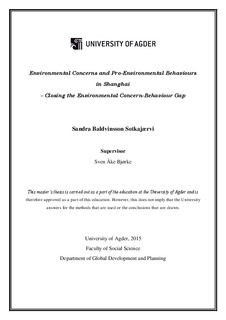| dc.contributor.author | Sotkajærvi, Sandra Baldvinsson | |
| dc.date.accessioned | 2015-09-18T08:17:16Z | |
| dc.date.available | 2015-09-18T08:17:16Z | |
| dc.date.issued | 2015 | |
| dc.identifier.uri | http://hdl.handle.net/11250/300698 | |
| dc.description | Master thesis development management- University of Agder, 2015 | nb_NO |
| dc.description.abstract | Environmental issues are among the biggest problems of our time. While green technology
and global initiatives are steps in the right direction, there is an environmental concernbehaviour
gap among individuals that prevents successful implementation.
Despite the government’s attempts to promote green development, China is one of the world’s
worst environmental offenders. China’s household registration system – Hukou – climate
change and resource scarcity are among the push-factors for many rural citizens to move to
urban areas in search for a better life. This migrant population tends to settle in urban villages
where they lack basic services and suffers from reduced social opportunities and benefits.
Urbanisation and change of lifestyles cause inequality, increase pressure on already scarce
natural resources, and contribute to enhanced greenhouse gas emissions. Individual concerns
and behaviours regarding environmental problems are therefore key issues in the fight against
climate change.
Existing literature on environmental concerns in China shows that urban, well-educated and
rich citizens tend to be more environmentally concerned than their rural, less-educated and
poor counterparts. They also find that the behaviours of the Chinese people do not correspond
with their concerns. This research provides a tool to help close this environmental concernbehaviour
gap. It contributes to the existing literature by including the Hukou system as an
influencing factor, and the rural migrants in Shanghai as a unique social group. The findings
of this mixed-method research show that bodily experiences have a profound impact upon the
concerns for environmental issues as well as pro-environmental behaviours. It is argued that
the Shanghainese lifestyle is so busy that they do not have the time to think before they act.
Instead, they act out of habits based on a mindset of saving money first. This thesis suggests
that standardised systems and enforced behaviours can convert these habits into saving the
environment first, and help closing the environmental concern-behaviour gap. Due to citizens’
economic priority and health concerns, environmental information encouraged by economic
incentives and health benefits might serve as impetuses for increased environmental concerns
and pro-environmental behaviours. | nb_NO |
| dc.language.iso | eng | nb_NO |
| dc.publisher | Universitetet i Agder ; University of Agder | nb_NO |
| dc.subject.classification | UT 503 | |
| dc.title | Environmental Concerns and Pro-Environmental Behaviours in Shanghai – Closing the Environmental Concern-Behaviour Gap | nb_NO |
| dc.type | Master thesis | nb_NO |
| dc.subject.nsi | VDP::Social science: 200::Human geography: 290 | nb_NO |
| dc.source.pagenumber | 133 s. | nb_NO |
